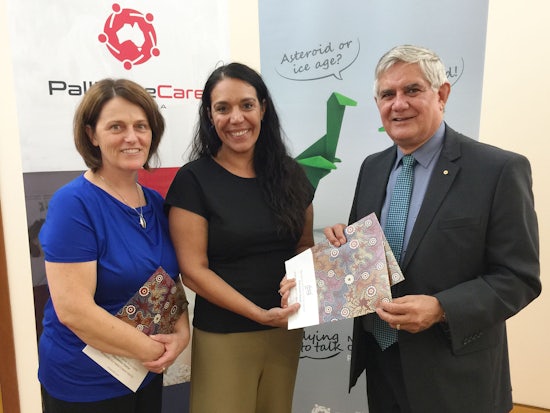Culturally appropriate resource helps Indigenous Australians discuss end of life
New resources to help Aboriginal and Torres Strait Islander people start the discussions about their end of life wishes have been launched this week by Minister for Aged Care and Minister for Indigenous Health, Ken Wyatt.

L-R: Liz Callaghan, CEO Palliative Care Australia; Janine Mohamed, CEO CATSINaM; Ken Wyatt MP, Minister for Indigenous Health
For many Aboriginal and Torres Strait Islander people, returning to country at the end of life and having a traditional burial are often important, and the Dying to Talk resources have been developed after consultations with Indigenous health organisations that identified the need for a specific resource for Aboriginal and Torres Strait Islander people.
“The end of someone’s life is a very special time in Aboriginal and Torres Strait Islander culture. To ensure people have the care they want, in the place they want, it is important to be able to plan and discuss their wishes,” says Janine Mohamed, Chief Executive Officer, Congress of Aboriginal and Torres Strait Islander Nurses (CATSINaM).
“These resources will help health care workers open conversations around end-of-life care in a culturally safe way.”
Developed in partnership by Palliative Care Australia (PCA) and CATSINaM, the Dying to Talk resources include a culturally appropriate step-by-step guide to make those difficult discussions about death that bit easier and a set of cards that can be used as a tool to start the conversations.
“Throughout the pages of the discussion paper and on the cards it asks us to consider a number of critical questions,” Minister Wyatt says. “It’s structured. It’s succinct. It’s clear. It helps start the discussion about what would happen if you or a loved one were sick.”
“When you are sick, what would happen to your family? What would happen to your belongings? What sort of health care do you want? How important is it to visit country? How important is it to be on country when you die? – these are all questions that need to be asked, and answered when we are still able to make our wishes known to the people we care about,” he adds.
“The resources will be distributed across Australia to Aboriginal Medical Services and Aboriginal Health Services which will in turn help Aboriginal and Torres Strait Islander people start a discussion about
dying in a way that is helpful, constructive and compassionate,” Minister Wyatt continues.
“It will help Aboriginal and Torres Strait Islander people have the most difficult of discussions, with respect and dignity.
”In developing the resources, PCA Chief Executive Officer Liz Callaghan says focus groups were held with Aboriginal and Torres Strait Islander people to understand what barriers they had in discussing their end-of-life care wishes and planning for death.
“Those focus groups informed the design and content of the Discussion Starter and the Dying to Talk Cards to ensure they were culturally safe and useful,” she says. “I also thank the Australian Indigenous Doctors’ Association and Indigenous Allied Health Australia for their input on this project.”
The resources can be downloaded from the Dying to Talk website or by emailing pcainc@palliativecare.org.au.










